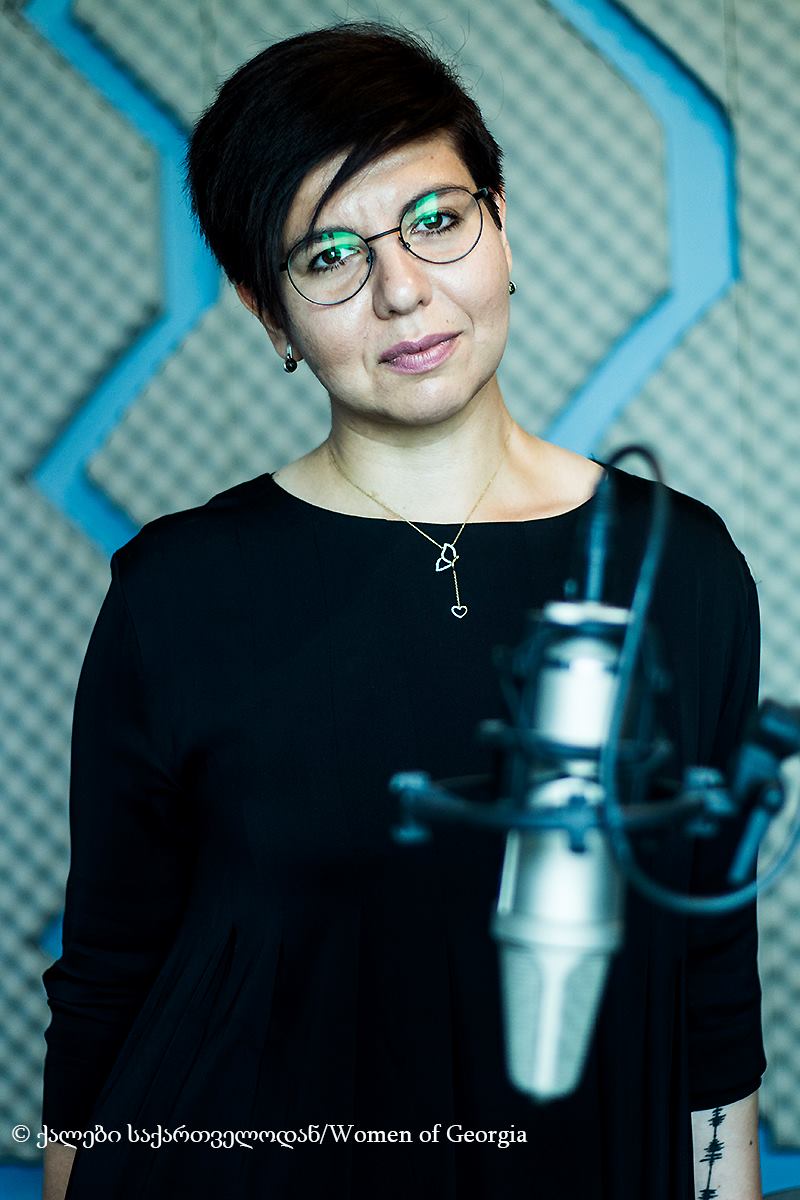Camila Mamedova, 32, Marneuli
Birth
I have a brother and a sister, both are older than me. I am the youngest and the last child in the family. I have never felt that I was unwanted as a child because of my sex. But I would still often tell my dad: “You probably wanted your third child to be a boy.” He would joke in reply: “No, I did not. I knew we would have a fourth child but Mom didn’t give birth to one.”
I was the youngest in our big family. Therefore, I was considered to be more pampered, I was provided with great love and freedom. My older siblings had some restrictions but I was allowed to do anything I wanted and they liked everything I did. I think that my sense of freedom came from that style of upbringing.
Two cultures
_____________
My mom is an ethnic Georgian and my dad is an ethnic Azerbaijani. When you live in a family with two cultures, your society forces you to make a choice between the two, to only side with one of them. But my family looked at this differently. To me, God is love and there was great love in our family among our parents and among the siblings. Therefore, I started to reflect on religion, ethnic belonging and other things at a very late stage. I remember one moment from my childhood: the 90s were a period when people had no electricity, no gas, no water supply. There was only one drinking water tap in our community and we would carry water in buckets from that basin. I was little, probably around 7… I would carry water with two small buckets with my friends with great pleasure. As I was filling in the bucket with water, it slipped from my hands and fell into the water. There were children standing around and I heard them saying: “Don’t help her. Her mom is Georgian”. It was the first time that I realised that something was wrong. Yes, I also remember that the Georgian children made friends with me because my mom was Georgian. At least that’s what they told me… Of course, those children must have heard that from their parents or other adults. I had that constant feeling that ‘I am an alien’; that I don’t belong. For instance, our relatives did not see our family as a traditionally Azerbaijani family. We were always different. That was probably because they did not see what was happening inside, what traditions we followed. In our family both cultures and religions coexist. We go to a church and a mosque. Moreover, we celebrate both holidays – muslim and christian. Dad was always enjoying all this: we would lay our supra and guests would visit. The society did not approve of these values but we decided to ignore what the others thought.
Father
My father passed away four months ago and I have started to better comprehend the role he played in me becoming an independent woman. When we had no electricity we would lie on a sofa and I would ask my dad to tell me a fairy tale. His stories were always on how strong and independent I was. In those tales I would always have a car – because dad dreamed that I would drive the best car, he would sit next to me and we’d go on a trip, or I would go wherever I wanted… He also wanted me to become a lawyer: I would solve a lot of cases in those fairy tales. I think those tales affected me profoundly.
—
Mother
My mother worked as a teacher all her life. She used to say that teaching is the best profession for a woman as she had more time left for us. But she never stayed home when I felt sick. So I could see that a woman needs some time for herself, for her own development. Therefore, I have never thought that I should not work and or that somebody else should provide for me.”
 “Asking for my hand”
“Asking for my hand”
———————-
My family has never been approached by people “asking for my hand”. They always knew that dad would never marry his daughters off and they did not even dare ask… However, something similar happened to me. It was actually very funny: the other family decided to form close ties with my family. They called my relative to ask for my sister. Once they found out that she was older than the groom, they turned to me immediately, ‘then what about the the second girl’. They did not care about which one of us they would end up with, they just wanted someone from the family. I was 18 and I remember that it affected me so much that I cried. I have been fighting for women’s (including mine) freedom of choice all my life.
I often think about the issue of early marriage and I see that the average age of marriage appears to be getting younger. I can’t remember anybody from the older generation of my relatives who married before their legal age. They thought it was essential for girls to receive education because a man, they thought, could always find a job that required a strong physical capacity and a woman should have a profession to support herself, if she happened to end up alone. Now we have two opposing poles: some receive very good education while others do not receive any education at all, as they marry at a very young age.
—-
Community Radio Marneuli
The community radio Marneuli has a long history, which starts from the year 2006 and I am one if its first ‘victims.’ This radio has greatly influenced my decision to receive professional education in journalism. I graduated from GIPA and I was among the most successful students.
The community radio seeks to give voice to each citizen of Marneuli. There is a huge information deficit and we try to fill the gaps. Those who speak Georgian can’t comprehend how hard it is when you have a language barrier. Just imagine, when we get up, we switch on the TV and listen to the news over a cup of coffee, or we listen to it on the radio, on the internet, etc. Imagine that people cannot do that because they can’t read or understand what everybody’s saying in Georgian. On our website we post information in both languages – Azerbaijani and Georgian and the Azerbaijani posts have a great number of views, unlike the Georgian ones. A Georgian-speaking person receives information from other sources – or if they don’t, it is their choice. That is, they don’t want to. Isn’t it great when you have a choice in whether or not you want to receive information? For an Azerbaijani-speaking person, the information sources are so limited that he/she receives only what is offered. They mostly listen to an Azerbaijani-speaking media which does not talk about the country they live in. Besides Marneuli news, we also cover events happening elsewhere in Georgia. These pieces are also popular as the Azerbaijanis mostly only hear rumours instead of news and do not understand what is happening in the country. I remember when the Rose Revolution was unfolding, they would call my dad and ask: what are they shouting about on TV? Imagine that there is a government overthrow happening in the country and they have no clue… When they were changing the national flag, some rumors spread. There was some anxiety about the flag having crosses on it, possibly meaning that we would be forced out of the country. Nobody talks to these people, they don’t think it is necessary to explain things to them and to inform them. By the way, do you know the reason why they refused to grant us a license for years? It was a political decision to keep ethnic minorities isolated and uninformed. We have now obtained the license and we will be on air as of September.
We are still developing and the employees at this radio are still learning a lot. That’s because the radio hires people with no academic background in journalism and some have never worked a day in their lives. Nonetheless, this radio is already a source of discomfort for the local government, because we openly point out the things that don’t work or malfunction. Besides politics, the radio often also comes under attack because we cover social and cultural problems, for instance, the issue of early marriage, and they think that we are discrediting the Azerbaijani nation by doing so. Yes, hiding problems seems to be a part of our mentality. As if the problem will go away on its own.
During the last three weeks I have been heavily criticized because of the way we covered an issue. They attack in interesting ways – mostly they send personal messages on Facebook, talking about my personal life, saying that I am lesbian, that I am a whore because I do not have a family. In short, here they are not used to the question ‘why’. I don’t want to hurt the feelings of my colleagues, but here media has never been critical. Our group is still learning, but we have become a source for some serious discomfort for the local government and that is why we are being attacked. Once we expand, once my journalists turn into professionals, I wonder what will happen to their fears.
Our goal is to set up a professional local radio. Here we have never had free and independent media and I believe that is exactly what we should aim for.”
Author: Ida Bakhturidze
Photo: Salome Tsopurashvili
Translation: Keti Khachidze

